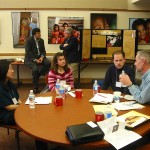
The final chapter in George Marsden’s The Outrageous Idea of Academic Communities Christian Scholarship [Oops! – Ed.] proposes that even the most impressive work of individual Christian scholars is not enough; Christian scholarship needs “a strong institutional base.”
Scholars, like everyone else, depend on communities. If like-minded academics do not form their own sub-communities, then they will be dependent entirely on the communities that already exist. These, of course, have little place for inquiry concerning faith and learning. If such inquiry is to grow as a recognized part of contemporary academia, it must depend on institutions and networks which can sustain that enterprise. (101)
Before getting to Marsden’s ideas, let me throw out a few discussion question: Have you experienced or witnessed successful communities of Christian scholars? What have been the outcomes? On the hand, have you seen failed or stunted attempts to build communities among Christian scholars? What went wrong?
Recognizing that, for a variety of reasons, evangelical Christians have failed to create research universities that can compete with the best secular universities, and that, to put it mildly, “the obstacles are formidable” to creating such a university, Marsden suggests some other ideas for institutional support. Some of these are already established, while others are just beginning. Marsden’s ideas are after the jump.
- Christian academic associations, like the Society of Christian Philosophers, Conference on Christianity and Literature, Conference on Faith and History, and the American Scientific Affiliation, to name just a few (a longer list can be found here)
- Research institutes that “explore the relationship of faith to learning” (103)
- Stronger “Christian academic dimension” at Christian liberal arts colleges
- Faculty development programs for Christian scholars (one of my InterVarsity colleagues works in just such a program at Union University)
- Summer seminars and fellows programs such as those that have been sponsored by the Lilly Endowment and formerly by the Pew Charitable Trusts
In all these, Marsden focuses on the role of communities in supporting scholarship. He also observes that faculty communities can play an important role in helping faculty develop spiritual virtues, particularly in an academic culture that frequently runs counter to Christian virtues.
Marsden concludes with addressing the question, “Isn’t secularization inevitable?” Isn’t it simply a matter of time before Notre Dame, Calvin, and Baylor follow the same path as Harvard, Chicago, and Duke, losing all trace of Christian distinctiveness? To this, Marsden answers, “Maybe,” but our hope lies in our “postenlightenment” moment. The Enlightenment assumption that cultural progress is possible through secular rationality has been discredited, thus
…for academic communities there should no longer be the assumption that the move to embrace the more enlightened and more secular standards of the culture of the resarch university is a course to improvement. (110)
I hope that’s the case, but I’m not so sure. The collapse of the Enlightenment project is most evident in the humanities, yet that is the discipline that remains most hostile to Christian scholarship.
Because we agree Marsden’s ideas, InterVarsity offers several resources for building academic communities:
- The ESN Mentoring Program
- Our Faculty Ministry guide to building community
- Local and regional events for Christian scholars
- National events like Following Christ
I’ll close with one new question and a repeated of my questions from above.
Are there other resources that you’d recommend for Christian scholars looking for communities?
Have you experienced or witnessed successful communities of Christian scholars? What have been the outcomes? On the hand, have you seen failed or stunted attempts to build communities among Christian scholars? What went wrong?
The former Associate Director for the Emerging Scholars Network, Micheal lives in Cincinnati with his wife and three children and works as a web manager for a national storage and organization company. He writes about work, vocation, and finding meaning in what you do at No Small Actors.

You may be heartened by Jason Byassee’s recent piece on Berea College and UVA: http://www.faithandleadership.duke.edu/content/campuses-the-kingdom
Apparently, I’m about a year-and-a-half late, but here are two basic problems with Christian/Evangelical academic networks: 1) they are professionally irrelevant (or even harmful) unless you are at a Christian institution, and 2) they often turn into Christians researching how “religion” intersects with a scholar’s field. In political science, for instance, Christian organizations like Christians in Political Science or the Religion and Politics section of the professional organization are really just about fellowshipping with other believers (of personal and communal value, yes) and researching … religion and politics. On the other hand, I don’t know much about math or physics as fields, but it’s hard to see what role a Christian organization would play beyond personal edification.
One other thing: very few (though some) top scholars publically invest in Christian academic organizations. In a merit-based environment, that doesn’t help, either.
My point is that despite intense awareness of their professional situation, Christians (even many Catholics, with their long scholarly traditions) only know what questions to ask, not what answers to seek.